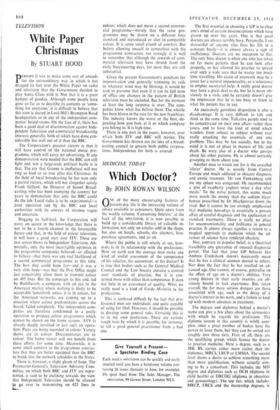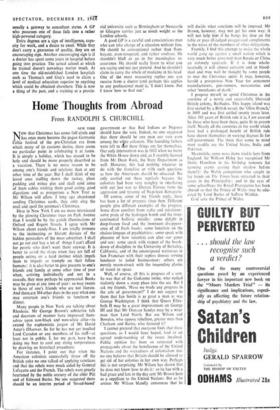Which Doctor?
MEDICINE TODAY By JOHN ROWAN WILSON (NNE of the more encouraging features of kjpresent-day life is the increasing volume of advice available to consumers. Quite apart from the weekly column, 'Consuming Interest,' at the back of the SPECTATOR, it is now possible to build up a considerable library of valuable in- formation, not only on articles sold in the shops, but also on hotels, schools, dry cleaners, hire- purchase agreements, and so on.
Where the public is still utterly at sea, how- ever, is in its relationship with the professions. How on earth can the average man make any kind of useful assessment of the competence of his solicitor, his accountant, or his doctor? It is true that bodies such as the General Medical Council and the Law Society exercise a control over standards of practice, but it is con- cerned more with ethics than competence. It does not help in an assessment of quality. What we really need is a kind of Guide Michelin to the professions.
This is rendered difficult by the fact that pro- fessional men are individuals and quite capable of suing for libel. However, it should be possible to develop some general rules. Certainly this is so in my own profession. There are various rough tests by which it is possible, for instance, to tell a good general practitioner from a bad one. The first essential in choosing a GP is to clear one's mind of certain misconceptions which have grown up over the years. One is that good doctors are always terribly busy. Personally, I am distrustful of anyone who lives his life in a constant bustle—it is almost always a sign of inefficiency. Doctors are no exception to this. The very busy doctor is often one who has taken on far more patients than he can look after properly, or has allowed his practice to spread over such a wide area that he wastes too much time travelling. His claim of overwork may be a cover for a natural unpunctuality, or a reluctance to employ secretarial help. A really good doctor may have a great deal to do, but he is never ob- viously in a rush, and he certainly doesn't give the impression that he is too busy to listen to what his patient has to say.
An excessively garrulous disposition is also a disadvantage. It is very difficult to talk and think at the same time. Talkative people tend to be concentrated on their own affairs rather than yours, and to have the kind of mind which wanders from subject to subject without ever really attacking the essentials of any one problem. This may be fun socially, but to my mind it is out of place in matters of life and death. Be wary also of a doctor who gossips about his other patients. He is almost certainly gossiping to them about you.
Another man to watch out for is the so-called 'clever' doctor. He is usually from Central Europe and much addicted to obscure diagnosis and exotic treament. 'Dr von Funkenberg told me my spleen was congested. He recommended a pint of raspberry yoghurt twice a day after meals.' To the naïve patient, this seems much more worth the money than the sodium bicar- bonate prescribed by Dr MacSporran down the road. But it cannot be too strongly emphasised that medicine nowadays is essentially a prosaic affair of careful diagnosis and the application of standard treatments. There is really no place for unconventionality and brilliance in general practice. It almost always signifies a return to a magical approach to medicine which the ad- vances of science have rendered obsolete.
Nor, contrary to popular belief, is a theatrical irascibility any guarantee of unusual diagnostic power. The fact that your GP behaves like Andrew Cruikshank doesn't necessarily mean that he has a clinical acumen denied to others. Nor does the fact that he has reached an ad- vanced age. One cannot, of course, generalise on the effect of age on a doctor's abilities. Very young doctors in their early twenties are ob- viously bound to lack experience. But, taken overall, the far more serious dangers are those associated with age, such as the decay of a doctor's interest in his work, and a failure to keep up with modern advances in treatment.
The degrees and diplomas behind a doctor's name can give a few clues about the seriousness with which he regards his profession. The diploma system in this country is wildly com- plex, since a great number of bodies have the power to issue them, but they can be sorted out roughly into three tiers. First of all, there are the qualifying group, which licence the doctor to practise medicine. Here a degree, such as a MB, BS, carries rather more cachet than the diplomas, MRCS, LRCP or LMSSA. The second level shows a desire to achieve something more than mere qualification, without actually aim- ing to be a consultant. This includes the MD degree and diplomas such as DCH (diploma in child health) or DRCOG (diploma in obstetrics and gynaecology). The top tier, which includes MRCP, FRCS and the mastership degrees, is usually a gateway to consultant status. A GP who possesses one of these falls into a rather high-powered category.
Extra degrees are a sign of intelligence, capa- city for work, and a desire to excel. While they don't carry a guarantee of quality, they are an encouraging sign. Another encouraging sign is if a doctor has spent some years in hospital before going into practice. The actual school at which he trained doesn't nowadays matter much. At one time the old-established London hospitals such as Thomas's and Guy's used to claim a level of medical education superior to anything which could be obtained elsewhere. This is now a thing of the past, and a training at a provin- cial university such as Birmingham or Newcastle or Glasgow carries just as much weight as the London schools.
A good GP is a careful and conscientious man who can take charge of a situation without fuss. He should be conventional rather than flam- boyant, even-tempered, and rather studious. He shouldn't bluff or go in for meaningless re- assurance. He should really listen to what you are saying and not just pretend. And he shouldn't claim to carry the whole of medicine in his head. One of the most reassuring replies one can receive from a doctor (and perhaps this applies to any professional man) is, 'I don't know. But I know how to find out.'































 Previous page
Previous page